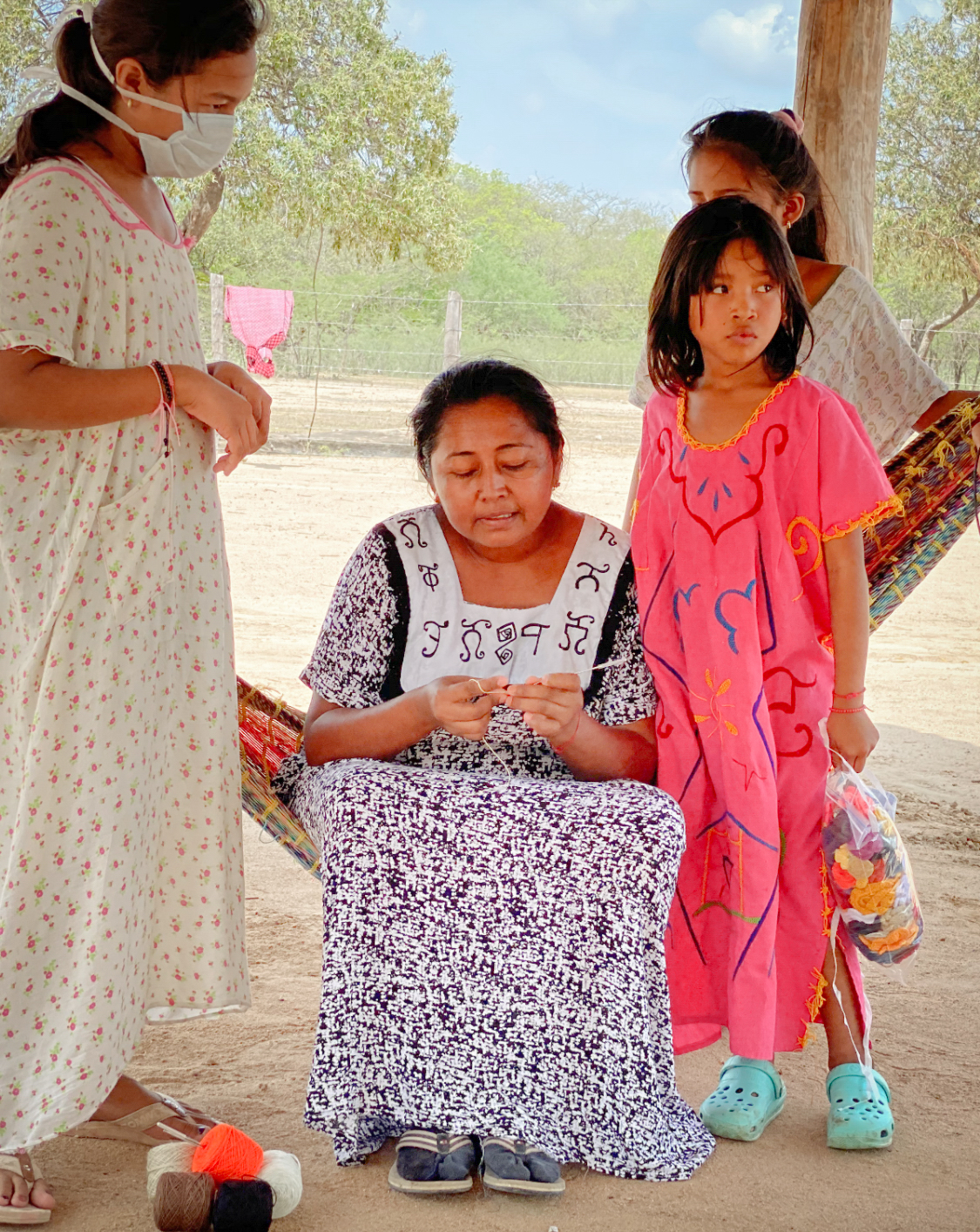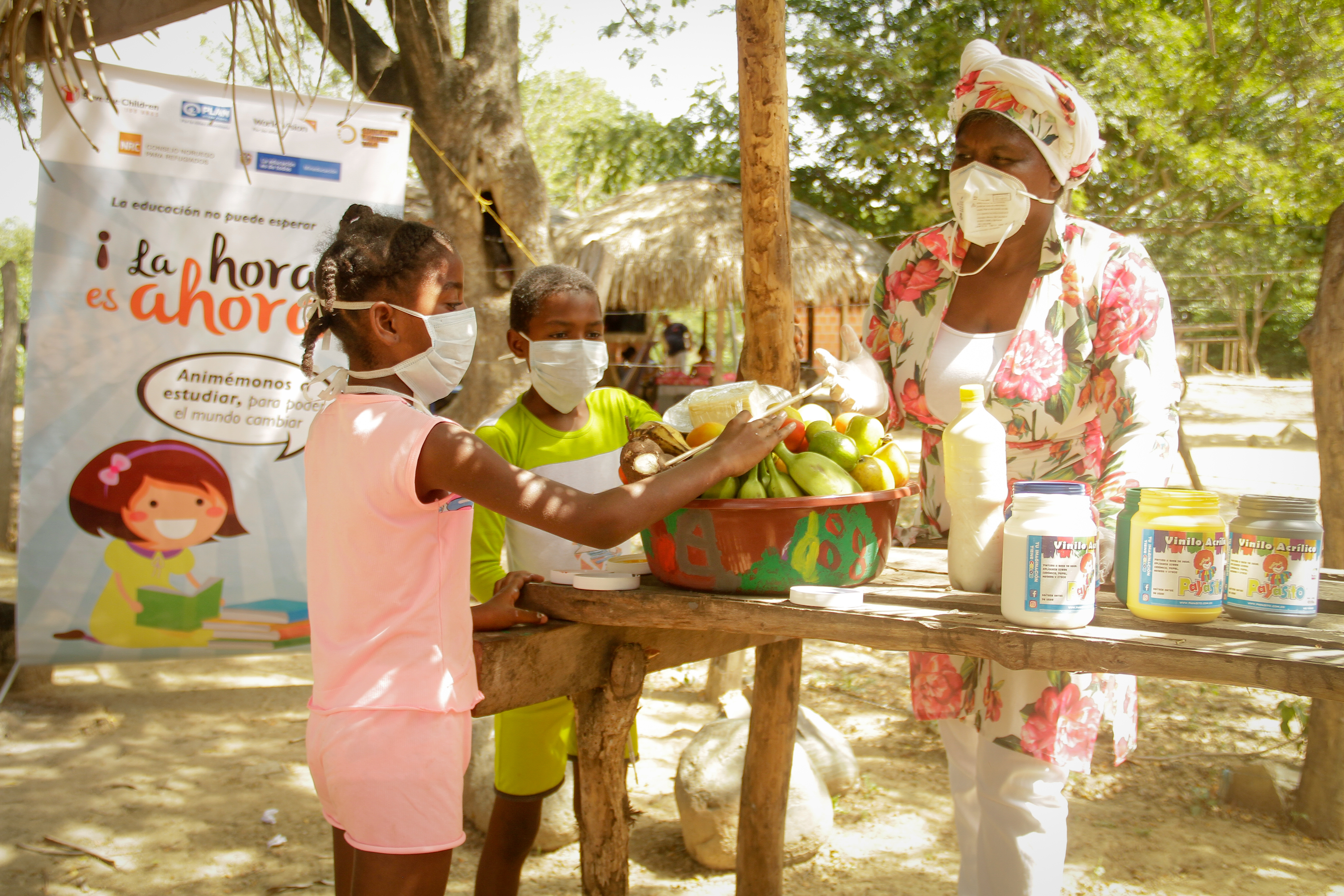KNITTING STORIES IN THE MIDDLE OF THE QUARANTINE
By: Katherine Maldonado Social Worker of World Vision Colombia
From the land of the thousand colors for the entire world…
In this moment of quarantine caused by the COVID-19, La Guajira, being one of the regions that has different cultures co-habiting, which gives it the name of pluri-ethnic region. Here they have indigenous people from the Wayúu, the Wiwas and the Kogui groups. And they also have afro-descendant communities. All of this allows people to know the simplicity of each and every one of this populations which show sublime greatness.

Starting from the cosmovision that gives great importance to knitting as a millenarian art for numerous indigenous towns from Latin America. World Vision, through the project “Access to Quality Education” developed, with the help of Education Cannot Wait, has highlighted the stories of the indigenous towns, afro-descendant communities, migrants and colombian returnees. Who through their hands, which is their only work tool, build the history that thousands around the world don’t know and don’t give it the importance that it deserves. This Stories have been built with the autonomy proper of this culture which is knitting. It is where they portray their thoughts, which transcend from generation to generation.
The communitarian social work, which consists of visiting each corner of the department of La Guajira, hasn’t been a challenge but a privilege. Because it has allowed us to get to know each of its lead players, particular dialects and stories that go across generations. As a result of the practice of knitting that goes beyond the making of marvelous pieces of art, it also hides teachings that come from past generations.
Knitting in the middle of the quarantine is a pedagogical strategy to identify the social dynamics in the families of girls, boys and adolescents from the project ECW. It also enables World Vision to perform an intervention with a differential approach and a focus on human rights. In the current context of the pandemic, the families experience different changes that affect the appropriate development of children. One of the possible evidences of the meaning that knitting has to all of these ethnics and afro descendent communities in the department of la Guajira, is that knitting is life, love, union and the boost that allows the strengthening of the household economy. Specially in this difficult time that they are living because of the global pandemic.
Therefore, deepen in the technique and elaboration of the knitting with the girls and women Wayúu is a teaching and learning challenge. This challenge grasps the discovery of the artistic movements that they perform with their fingers. Each one has a reason and a purpose, which goes beyond execution. They learn all of the techniques needed for each figure and form, involved in the development of a Wayúu knitting, from the wisdom of the “Machón” (Grandma). For them, performing this practice enables them to keep the autochthonous part of their culture through the generations. Which has allowed them to go into the new globalization era without losing what they have learned from their past ancestors.

Photo: They learn all of the techniques needed for each figure and form from the wisdom of the “Machón” (Grandma).
Knowing the majesties that inhabits in the towns of La Guajira, from the areas of protection and education World Vision continues strengthening its project on children and adolescents care. This through focusing in identifying the social and family ties, which allows World Vision to keep a differential approach, which enables WV to know and confirm if the children and their family units are well.
The work team of World Vision in La Guajira, working in the search of stories for “Knitting Stories”, arrived at the scattered rural area of Rioacha and Maicao where a big population of afro-descendent people lives. The women from this group stand out. The ability to make hair braids comes from them. They have been making hair braids daily during the quarantine, to entertain themselves.
Beyond entrainment and making marvelous braids, the technique and design has an origin and a tradition, based on its applications and customs acquired from various generations. This has allowed them to learn how to make majestic hairstyles just using braids on the afro hair that characterizes the descendants of the afro-Colombia in La Guajira.

Photo: That women who combines the skill of their hands with the wisdom from their ancestors, with the ability that only afro-descendent women have.
Stefany is a young afro- descendent girl, a living example of the heritage of her afro-Colombian ancestors. The skill and easiness that her fingers have while braiding the hair of a girl for whom she made a hairstyle is incredible. She narrated the following: “I learned by looking at how my relatives did hairstyles. I have memorized it since I was a little girl and I will never forget it. We have been affected by the sanitarian emergency. But we continue braiding at our homes, so we don’t lose the tradition. I want to teach my daughter; I’m waiting for her to be 3 years old to make her some hair paths.”
For many the unknow calls to be known. This is why knowing the secrets behind doing braids is discovering the paths of life according to that women’s vision. That women who combines the skill of their hands with the wisdom from their ancestors, with the ability that only afro-descendent women have.
In the same way, the indigenous communities Wiwa, who live in La Guajira, combine their spirituality not only with the construction of knitting but also with their ability to make handicrafts. “We build from the smallest to the biggest. It not only is a transition for our bags but also for our wisdom. Because we connect with our ancestors and with nature.” Affirms María Rodríguez Rosado a member of the Wiwa indigenous community.
While getting to knowing the wise world of the indigenous and Afro-descendent communities of the region, through the project “Knitting Stories in the middle of the Quarantine” caused by the COVID-19, World Vision has made important deliveries of materials needed to continue with the tradition of knitting that these ethic communities have. Moreover, according to the differential approach and based on the cosmovision of the indigenous towns Wayúu and Wiwa, World Vision delivered kits with colorful threads so the elaboration of crafted bags could continue. This communities are complying with the mandatory preventive isolation, so they don’t catch the virus. Therefore, these kits allow them to work as a family and teach the girls and majayut (adolescents) at home.
On the other hand, the afro-descendent communities continue braiding their hair as a symbol of strength and resilience. In the middle of the isolation, this practice has enabled them to meet again and strengthen their wisdom that wanted to be taken away from them during the times of slavery. World Vision also gave complete kits to these communities so they could continue with their practice and search of wisdom. The purpose is to support the strengthening of the cultural traditions of the afro-descendent communities, especially during the pandemic.
Gender approach
During the delivery of the crafted production kits, the indigenous and afro-descendent communities had a single harmony and was palpable that all of them had similarities regarding wisdom search, cosmovision, wanting to preserve their culture and wanting to teach girls and women essential skills to build their family units.
Other stories that have been knitted are based on the migration phenomenon. These stories involve Venezuelans as well as Colombian returnees who live in conditions of extreme vulnerability. Life stories emerges from this communities and contribute to building a fairer society. Children and adolescents whom are part of this communities in La Guajira were able to participate and expressed the union of two brotherly countries, through different drawings. Two countries that today, more than ever should be together in isolation because of the COVID-19 pandemic.
Telling the stories never changes but the way they are told does. Getting to know the empirical part of these communities is a privilege that we could only get if we become part of their history, wisdom and especially a part of the joint efforts to maintain their cultural traditions, family harmony and prevent violent situations.
